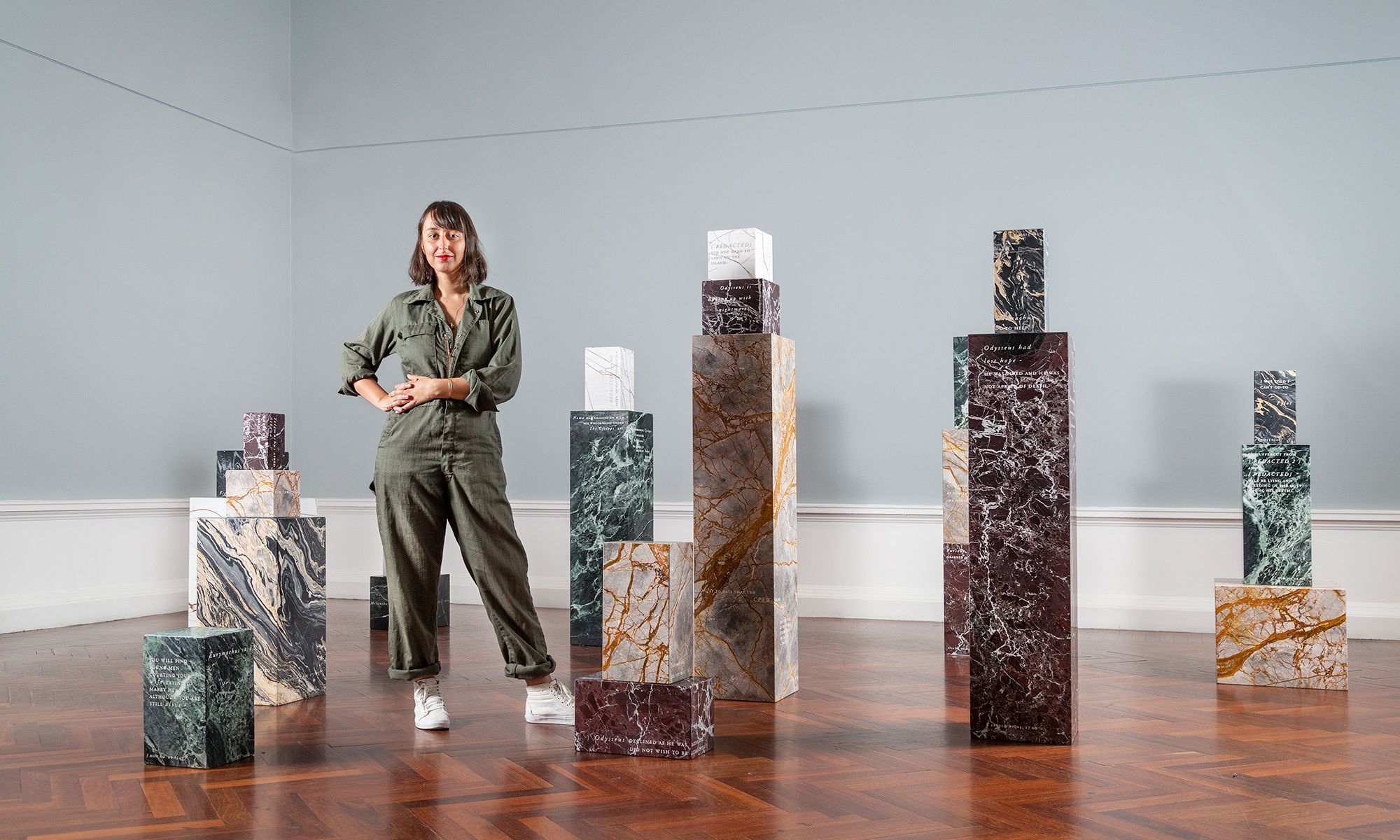Stanislava Pinchuk with her work The Wine Dark Sea in this year's edition of the Adelaide Biennial of Australian Art: Free/State, Art Gallery of South Australia Photo: © Saul Steed
Since the Russian invasion of Ukraine began last month, the Ukrainian-born Australian artist Stanislava Pinchuk has shed many tears.
Atrocities such as the fatal cruise missile attack on Freedom Square in her home town of Kharkiv have been “unthinkable”, Pinchuk told The Art Newspaper on 3 March, the opening day of the Adelaide Biennial of Australian Art where she is exhibiting a work.
Titled The Wine Dark Sea, Pinchuk’s piece resonates eerily with Russian President Vladimir Putin’s ordered invasion of Russia’s neighbour, intertwining the “narratives we choose to accept and celebrate, and those we choose to ignore,” she said.
The Wine Dark Sea remixes phrases from two written sources separated by millennia—Homer’s epic poem The Odyssey, and the so-called Nauru files, which were leaked to the media in 2016. Human Rights Watch said the whistleblower files “paint a sordid picture of Australia’s offshore refugee detention operations on the Pacific island of Nauru”.
The intertwined phrases from both sources, making oblique reference to ideas around arduous journeys and inhospitable hosts, are carved on portable marble blocks and columns.
The marble components are stackable, and can be arranged in a different order every time they are displayed. For Pinchuk, this recalls the tradition whereby visitors rearrange the stones on what is believed to be Homer’s grave on the Greek island of Ios.
"The Wine Dark Sea is a love letter to Homer and the Odyssey. Odysseus is in some ways all of us,” Pinchuk told The Art Newspaper.
"I hope there's a certain universality to the work. This could be a work about Manus/Nauru [Australia’s offshore detention centres], it could be a work about Ukraine, about Syria, about Yemen, about Palestine, about Bosnia. A myriad of places."
Sebastian Goldspink, the curator of the Adelaide Biennial, says: "A work like Stanislava’s, which speaks to the universal experience of having to leave home through turmoil, is something that unfortunately is always relevant." He says Ukrainians are resilient people and Pinchuk is emblematic of that. "She's a tough person," he adds.
Asked if The Wine Dark Sea had parallels with the Russian invasion and the plight of Ukrainians, Art Gallery of South Australia director Rhana Devenport said: "Absolutely. She’s always been focused on giving voice to those who are voiceless or have little access to be heard."
The Adelaide Biennial is on view at the Art Gallery of South Australia until 5 June. Devenport adds that The Wine Dark Sea was “exquisitely beautiful” as well as operating as a portal to enduring themes of home and journey.
A career survey of Pinchuk’s work, called Terra Data, is on view near Melbourne at the Heide Museum of Modern Art (until 20 June). The survey demonstrates how Pinchuk’s data-mapping of former conflict sites has informed her work.
While grieving for Ukraine’s plight, Pinchuk said she is optimistic for a people who cherish freedom because they know what it is like to lose it.
“It’s in our psyche, in our soul. I don't know what you can do to defeat that,” she said.
Pinchuk was born in 1988 in the outer Kharkiv suburb of Roganj. She grew up in Melbourne from the age of nine, and later studied philosophy at university.
Pinchuk now lives in Sarajevo. She has returned to Ukraine many times in the past eight years to complete artworks. These include the meticulous data-mapping of Maidan Nezalezhnosti, the main square in the Ukrainian capital of Kyiv. In 2013-14, Maidan was the focal point of a popular pro-democracy uprising during which more than 100 citizens lost their lives.

